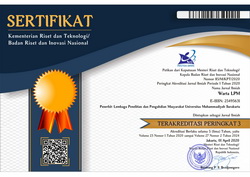Pengenalan Pendidikan Seks Anak Usia Dini pada Orang Tua di Masa Pandemi Covid-19
DOI:
https://doi.org/10.23917/warta.v25i2.640Keywords:
sex education, pandemic Covid-19, early childhoodAbstract
Sexual violence is prone to occur in early childhood. The forms of violence experienced by early childhood are forms of violence with the highest number of cases and most of the perpetrators are the closest people around the child. During the early period of the Covid-19 pandemic, there was a spike in cases of sexual violence against children. At the beginning of the Covid-19 pandemic, March 16 - April 19, 2020, it was known that there had been an increase in cases of sexual violence against children from 60 cases before the pandemic to 97 cases at the beginning of the pandemic. The results of the initial questionnaire obtained from 67 respondents before the webiar, showed that 20% of parents did not understand sex education well. This webinar on early childhood sex education aims to make parents able to give the right explanation to their children from an early age. So that children have a correct understanding of sex and are able to protect themselves from sexual violence. The webinar, which contains explanations and discussions about sex for an early age, was attended by 61 participants, who are parents of PAUDIT Mutiara Hati Klaten. In addition to explanations in the form of oral presentations of material about sex education, material using videos and pictures was also presented to 61 participants. Based on these results, sex education for early childhood needs to be disseminated again so that all elements of society also better understand which will lead to a decrease in sexual violence against children. Sex education in children is expected not to stop at the PAUD level, but can be continued at the next level of education.
Downloads
References
Arikunto, S. (2016). Prosedur Penelitian Suatu Pendekatan Praktik. Jakarta: Rineka Cipta.
Chomaria, N. (2012). Pendidikan Seks untuk Anak. Solo: Aqwam Solo.
Durahman, N., Noer, Z. M., Hidayat, A. (2019). Aplikasi Seminar Online (Webinar) untuk Pembinaan Wirausaha Baru. JUMIKA: Jurnal Manajemen Informatika, 6(2), 111-120.
Eny, P., Kadir, A., Kartika, C. S. D., Shafira, F., Yudhiarti, N. P., Istiqamah, S. N. (2018). Peningkatan Keterlibatan Orang Tua dalam Pendidikan Seks Anak. Jurnal Warta LPM, 21(2), 143 – 151.
Fothergill, A. (2017). Children, Youth, and Disaster. Oxford Research Encyclopedia of Natural Hazard Science.
Handayani, A & Amiruddin, A. (2008). Anak Anda Bertanya Seks?. Bandung: Khazanah Intelektual.
Inul, B., Sudiwati, N. L. P. E., Maemunah, E. (2018). Hubungan Tingkat Pengetahuan Orang Tua tentang Pendidikan Seks pada Anak Usia Prasekolah (3-6 Tahun) di RW 06 Kelurahan Tlogomas Kecamatan Lowokwaru Malang.
Kandedes, I. (2020). Kekerasan terhadap Anak di Masa Pandemi Covid-19. Jurnal Harkat: Media Komunikasi Gender 16(2), 66-76.
Lestari, D. A., & Tenri Awaru, A. O. (2020). Dampak Pengetahuan Seksual Terhadap Perilaku Seks Remaja di Kecamatan Manggala Kota Makassar. Jurnal Sosialisasi, 7(1), 21-28.
Mansyur, A. I & Kusuma, R. M. (2019). Webinar Sebagai Media Bimbingan Klasikal Sekolah untuk Pendidikan Seksual Berbasis Online (Meta Analisis Pedagogi Online). Jurnal Suloh: Jurnal Bimbingan Konseling FKIP Unsyiah, 4(1).
Nurani, Y. (2013). Konsep Dasar Anak Usia Dini. Jakarta: PT. Indeks
Solihin. (2017). Pendidikan Seks Sejak Usia Dini Salah Satu Upaya Mencegah Child Sexual Abuse. Jurnal Pendidikan: Early Chilhood, 1(2), 1-13.
Sommaliagustina, D. (2018). Interpretasi Feminisme: Analisis Resepsi Khalayak Pekanbaru tentang Film Kartini. Jurnal Perspektif Komunikasi, 2(02)
Suprapti, I. M. (2013). Model-Model Pembelajaran Komunikatif dan Inovatif. Surakarta: Fataba Press.
Yulianti, D. (2010). Bermain Sambil Belajar Sains di Taman Kanak-Kanak. Jakarta: PT. Indeks.
Downloads
Submitted
Published
How to Cite
Issue
Section
License
Copyright (c) 2022 Warta LPM

This work is licensed under a Creative Commons Attribution 4.0 International License.















